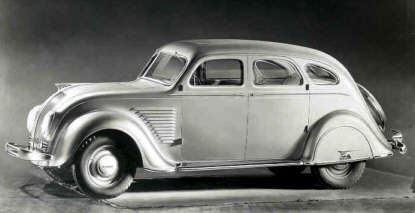One new engineering feature was all-steel bodies (aside from a roof panel) built up from a frame structure attached to what amounted to a chassis. To put it another way, Airflow bodies approached, but didn't qualify as, unitized construction that since then has become the norm.
At any rate, for launch year 1934 Chrysler produced Airflows in three basic body types (four-door sedans, two-door sedans, and coupes) and for the 4-door sedans, five different wheelbase lengths. Wheelbases in ascending order are -- DeSoto: 115.5 in (2934 mm); Chrysler CU: 122.8 in (3119 mm); Chrysler Imperial CV: 128.0 in (3251 mm); Chrysler Custom Imperial CX: 137.5 in (3492 mm); and the Chrysler Custom Imperial CW: 146.5 in (3721 mm).
What we have, then, is a wheelbase range of 31 inches (787 mm) -- a huge difference for one line of cars. Coupling that with the various body types, Chrysler Corporation launched a wide variety of Airflows. Here are examples.
The largest '34 Airflow was the CW Custom Imperial 8- passenger sedan that featured a curved windshield -- the first for an American production car.
All 1934 DeSotos were Airflows, Chrysler retaining conventional bodies for its 6-cylinder cars. This is the four-door sedan.
Then there were coupes. The smallest, due to its short wheelbase was this 1934 DeSoto (Bonhams auction photo).
Advertisement photo featuring a 1934 CW Custom Imperial. The background is the Park Avenue entrance to the Waldorf-Astoria hotel.









